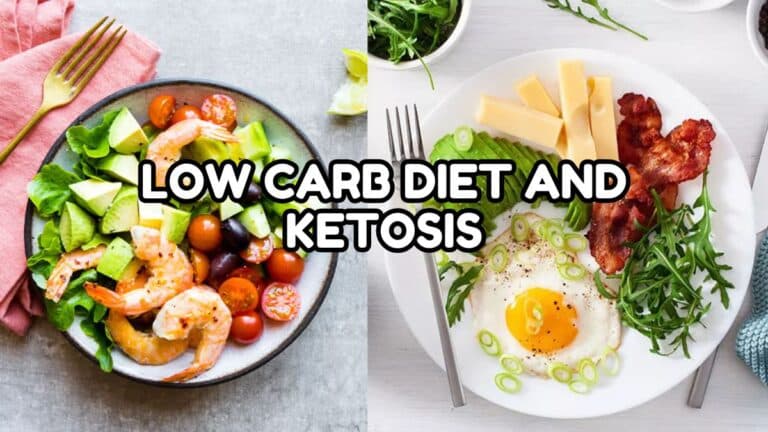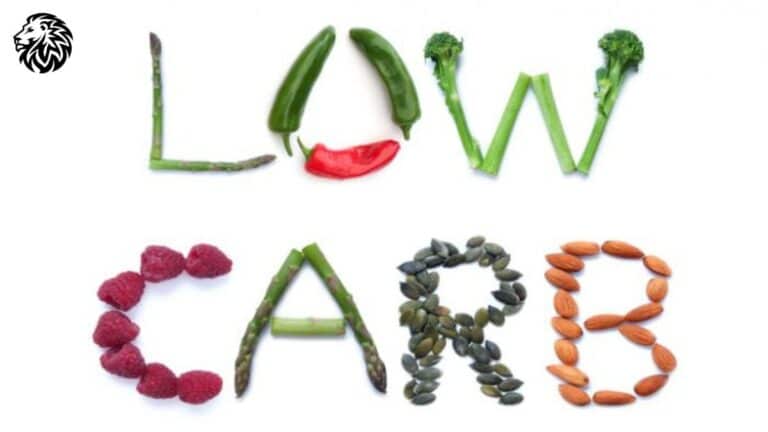Understanding Low-Carb Diets
Basics of Low-Carb Diets
You ever think too many carbs got you feeling all sluggish and stuck? Well, a Low-Carb Diet (LCD) might just turn that around. By skipping the sugary stuff, pasta, and bread, and chowing down on more meats, fats, and veggies, your body hits the “switch.” It starts burning fat for energy instead of carbs. This change can help with weight loss and even make you feel better all around.
Now, let’s break down carbs: they’re split into simple and complex. Simple ones make your blood sugar spike, like a cat seeing a laser pointer. Complex carbs, though, are more like a marathon, slow and steady. By cutting these guys off, your body steps into something called ketosis, burning fat like a champ.
Types of Low-Carb Diets
There ain’t just one way to skin this cat; you got loads of low-carb diets, each with its own kind of charm. Check out some of the crowd favorites:
| Diet Type | What’s the Deal? | Daily Carb Cap |
|---|---|---|
| Ketogenic Diet | Load up on fats, a bit of protein, barely any carbs | 20-50g |
| Atkins Diet | Starts super low-carb, then eases up | First Phase: <20g |
| Paleo Diet | Stick with what cavemen ate, ditch the junk | Roughly low |
| South Beach Diet | Picks what’s good or bad in carbs and fats | Phase 1: <50g |
Ketogenic Diet
Keto is like the heavyweight champ of low-carb diets. You load up on fats, chill on proteins, and keep carbs on the down-low. Your body hits ketosis, not just shredding pounds but sharpening your mind too. Science says it can boost brainpower and help with stuff like epilepsy.
Atkins Diet
With Atkins, you’re easing in. It starts super low on carbs, then dials them back in little by little. It helps keep the weight off and even manage blood sugar—perfect for folks dealing with Type 2 Diabetes.
Paleo Diet
Think like a caveman with the Paleo Diet. Munch on foods your ancestors would recognize. Goodbye processed junk, hello fresh and healthy. It’s naturally low on the carb scale and all about boosting your overall well-being.
South Beach Diet
South Beach plays the long game, sorting carbs into “good” vs. “bad.” Starts low to squash cravings and get your sugar levels in line, then brings back the healthier carbs later on.
Each type of low-carb diet is like a puzzle piece—find the one that makes your health goals fit just right. Want the 411? Head to our low carb diet for beginners and low carb diet benefits pages for all the juicy details.
Ready to take the plunge into low-carb life? Peek at our low carb meal plan and discover some killer low carb recipes to make the switch more like a breeze.
Weight Loss on Low-Carb Diets
Initial Weight Loss Effects
Kicking off a low-carb diet often feels like you’ve stumbled onto a dieting goldmine. Initially, you may notice those pounds drop faster than a hot potato. What gives? Well, you’re mainly losing water weight and glycogen that’s been hanging out in your system. Some research shows low-carb ways can outshine other diets in the quick-loss department, especially during the first 6 to 12 months (NCBI). Folks on a low-carb kick might burn 200 to 300 extra calories compared to their high-carb counterparts.
Take a gander at these early weight slashing stats:
| Time Frame | Weight Loss (kg) | Weight Loss (%) |
|---|---|---|
| First 6 months | 11 kg | 11% |
| First year | 11 kg | 11% |
These numbers paint a picture of hefty weight drops in that first year.
Long-Term Weight Loss Considerations
Now, keep that diet train rolling, ’cause holding onto those results is all about sticking it out. Long-term outcomes show that weight loss might slow down but still stick around nicely. Two years in, people generally keep off about 7 kg, around 7% of their weight (NCBI).
Here’s a peek at long-haul weight loss data:
| Time Frame | Weight Loss (kg) | Weight Loss (%) |
|---|---|---|
| 2 years | 7 kg | 7% |
Beyond tipping the scale, low-carb diets serve up some sweet health perks. They might spruce up your lipid profile, help shake off Type 2 Diabetes, and shrink away liver fat (NCBI). Real-world stories back it up, showing major prediabetes reversal and drug-free T2DM remission in an NHS primary care setting.
For those eyeing variants like the MCT (Medium-Chain Triglyceride) diet, you’ll be happy to hear MCTs whip up quick energy or ketones, making it a bit more lenient on the carb count (Healthline).
If you’re itching to dive into low-carb living, peek at our meal plans and best food picks, and if you’re pondering the long-term ride, swing by our piece on diet risks for the skinny on staying safe.
Health Impacts of Low-Carb Diets
Thinking about diving into the world of low-carb diets to see how it might jazz up your health? Let’s chat about its effects on blood sugar levels and cholesterol, which are big players in your health game.
Effects on Blood Glucose
If you’re keeping an eye on blood sugar levels, especially with type 2 diabetes hanging around, there’s some good news. A low-carb diet could be your new best friend. Research shows kicking carbs to the curb for just two weeks can jazz up your 24-hour blood sugar readings, make your insulin do a happy dance, and even lower that pesky hemoglobin A1c in folks dealing with obesity and type 2 diabetes.
But wait, there’s more! The pluses aren’t just short-term. Stick with it, and you might find yourself with better blood sugar levels and shedding some pounds. Some folks even cut back on their medicines and wave goodbye to diabetes symptoms. Curious if low-carb could shake things up for your diabetes management? Check out our low carb diet for diabetes type 2 section.
Impact on Cholesterol Levels
Now, let’s chat cholesterol. High or low, it’s got a big say in your health. Here’s how low-carb measures up:
| Cholesterol Type | Effect |
|---|---|
| HDL (Good) | Up by ~23% over 2 years (NCBI) |
| LDL (Bad) | Could go up a bit, results vary person-to-person |
| Total Cholesterol | Typically gets a bounce from HDL improvements |
| Triglycerides | Takes a nosedive, better than low-fat diets (NCBI) |
Those on a low-carb mission often see their “good” HDL cholesterol going up. HDL is your cholesterol janitor, sweeping away the bad stuff. Folks saw a neat 23% rise in HDL when living carb-light for a couple of years.
Plus, a low-carb lifestyle can really take a bite out of triglyceride levels, a key heart health marker. The drop in triglycerides with low-carb is way more impressive than its low-fat counterpart at 3, 6, and 12-month marks.
Deciding to give low-carb a whirl? Consider the ups and potential downs. If you’re on a cholesterol mission, our page on the low carb diet and cholesterol is packed with wisdom.
Switching to low-carb could be your ticket to swapping flab for fab. Keep stacking knowledge on the best low carb foods to savor the gains while keeping tabs on other health markers.
Sustainability and Safety
Concerns with Long-Term Use
So you’re thinking of hopping on the low carb diet train? Well, before you dive in, let’s chat about what this choice could mean for the long haul. While shedding pounds quickly might sound tempting, the truth is that low-carb diets might not offer a significant leg up over your good old balanced diet when it comes to keeping those pounds off for good.
Sure, cutting carbs can zap off excess water weight and glycogen to slim down fast. But when you stick with this diet for months—or even years—you might bump into some bumps on the road, like:
- Heart Flutters and Tickers: Messing with your electrolytes might give your heart a bit of a hard time.
- Bone Blues: Skipping out on vital nutrients might make your bones more brittle over time.
- Kidney Strain: Packing in the protein can make things tough on your kidneys.
- Cancer Concerns: Some folks link high-fat and low-carb lifestyles with certain types of cancer.
- Energy Drains: Fewer carbs might leave you feeling a little less energetic, especially if you’re big on your workouts.
- Lipid Woes: Don’t be surprised if your blood lipids aren’t looking too hot either.
Maintaining Nutritional Balance
If you’re set on going low-carb, staying nutritionally balanced is your new best friend. Here’s the low-down:
Macronutrient Balance:
- Proteins and Fats: Don’t skimp on the protein to keep your muscles fueled and healthy fats to keep your brain and hormones in check.
- Carbohydrates: Even when the carbs are cut down, squeezing in some high-quality, nutrient-rich ones is non-negotiable.
Micronutrients:
- Vitamins and Minerals: Munch on low-carb goodies like spinach, broccoli, and bell peppers to keep up your vitamin and mineral defense. If you drop certain foods, a supplement might be your safety net.
Hydration:
- Water Intake: With your kidneys working overtime on protein, drink up! Keep that water bottle within arm’s reach all day.
| Nutrient | Recommended Intake on a Low-Carb Diet |
|---|---|
| Protein | 20-30% of total daily calories |
| Fat | 60-70% of total daily calories |
| Carbohydrates | 5-10% of total daily calories |
Nutritional Supplements:
- Multivitamins: Pop a multivitamin hver day to fill any dietary potholes.
- Electrolytes: Boost your electrolyte game with potassium, sodium, and magnesium supplements to keep imbalances at bay.
Carving out a well-rounded low-carb routine using these tips can smooth over some of the speed bumps of long-term dieting. Need more low-carb inspo? Check out our low carb meal plan and low carb recipes.
Fancy knowing more about what low-carb eating can do to your health? Our low carb diet risks and low carb diet and cholesterol are just a click away.
Transitioning from a Low-Carb Diet
So you’ve hit your targets with a low carb diet and now you’re thinking, “Can I have bread again?” Getting carbs back into your life while dodging unwanted side effects is all about patience and a game plan.
Reintroducing Carbohydrates
Ditching an ultra low-carb or keto gig isn’t as easy as saying hello to a plate of spaghetti. Take it easy—slow and steady wins this carb race.
1. Slow and Steady Wins the Race: Crank up your carb intake by about 25% each week. Easy does it! This way, your body won’t have a meltdown. (Veri).
2. Fiber Is Your Buddy: Start with fiber-packed goodies like whole grains, fruits, and veggies. They’re like the peacekeepers for your gut, making the transition smoother than butter on toast.
Example Plan:
| Week | Daily Carb Intake |
|---|---|
| 1 | Bump it by 25% |
| 2 | Halfway back at 50% |
| 3 | Gettin’ close at 75% |
| 4 | Full swing, baby! 100% |
3. Listen to Your Body: Be your own body detective. If bloating, gas, or the energy drain starts looking familiar, tweak those carbs.
Managing Post-Diet Symptoms
Trying to hop off a low-carb diet can leave you feeling like you’ve been caught in a cookie jar. Your body needs some TLC as it remembers how to enjoy carbs again.
1. Insulin Ups and Downs: After kicking it low-carb style for a while, your system might have a minor sugar excitement—it’s expected. Temporary blood sugar spikes can create tummy troubles like bloating or sluggishness.
2. Keep The Fluids Flowing: Drink up! Staying hydrated is your ticket to handling more carbs without any tummy temper tantrums.
3. Nutritious Balance: Keep munching on a well-rounded diet filled with good fats, proteins, and the whole nutrient shebang. It’s the recipe for maintaining that hard-earned health shine.
Internal Links:
- Worried about diving back in? Get schooled on managing diet changes low carb diet for beginners
- Check out the trick play of fiber-rich foods in your comeback best low carb foods
- Hold onto your gains with savvy tips low carb diet benefits
Follow these steps, and you can welcome those french fries back into your life while keeping the perks of your low-carb adventures.
Special Considerations and Benefits
Thinking of giving the low-carb diet a spin? You might wanna stick around as we uncover both some handy pointers and the unexpected perks of going easy on those carbs. This bit dives into how it could be a game-changer for certain health stuff and give your brain a little extra boost, too.
Low-Carb Diets for Specific Conditions
Low-carb feasting isn’t just about shedding a few pounds—it’s showing promise in handling a variety of health hiccups:
Type 2 Diabetes
A low-carb approach can do wonders for folks dealing with type 2 diabetes. One study had peeps on a low-carb plan for two weeks and saw not just slimmer glucose levels round the clock, but also a peppier insulin response and happier hemoglobin stats. Some folks even talk about it dialing back the need for meds (NCBI).
Non-Alcoholic Fatty Liver Disease (NAFLD)
For folks with NAFLD, cutting carbs can work like magic too. After six weeks on this diet, a study noted big dips in liver fat levels. Wanna read more on tuning your diet plans for certain conditions? Check out our little nuggets on low carb diet for diabetes type 2, low carb diet for pcos, and low carb diet for hypothyroidism.
Epilepsy
The ketogenic diet, a popular variety of low-carb, has been a lifesaver for kids battling with epilepsy by cutting down their seizures by a whooping 75%. Plus, it’s hanging tough on the adult front, especially when traditional meds aren’t cutting it (Healthline).
Cognitive Benefits of Low-Carb Eating
Low-carb diets, especially the keto kind, don’t just keep you looking fit but might also sharpen your thinking cap:
Mild Cognitive Impairment (MCI) and Alzheimer’s Disease (AD)
For folks with a little memory fog or Alzheimer’s, going low-carb can spice things up in the brain department. Studies hint at fresh brain cell action and the kind of brain chemistry that rocks memory and other smarts.
| Condition | Low-Carb Upside |
|---|---|
| Type 2 Diabetes | Smooths glucose, boosts insulin mojo, less med reliance |
| NAFLD | Major liver fat drop |
| Epilepsy | Fewer seizures, top-notch help for stubborn cases |
| MCI and AD | Jump in new brain cells, mind sharpness |
These tidbits show that ditching carbs might just be your ticket to more than just a smaller waistline. Whether it’s your mind you wanna perk up, some persistent health gremlin to manage, or the hope of needing fewer pills, a low-carb world could have a seat with your name on it. For more juice on low-carb diet perks and tips to get going, dive into our guides and luxe your meal times with our menu options.







